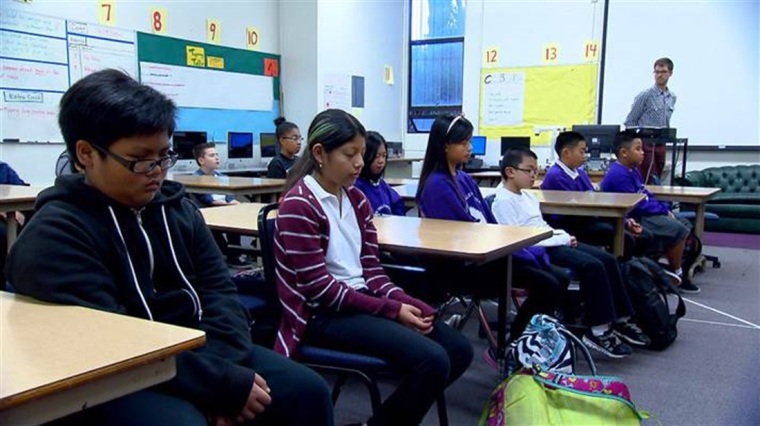Meditation Program Curbs Violence, Enhances Learning In U.S. Schools

Thanks to the power of meditation, tranquility has come to the schools located in one of the poorest and violence-wracked neighborhoods of San Francisco, California.
Talking to NBC News recently, school administrators said the introduction of a meditation program called "Quiet Time" to at least four schools in the area has brought peace and order inside the school campuses and even improved the attendance and academic performance of students.
Barry O'Driscoll, athletic director of Visitacion Valley School, said violence in the neighborhood used to spill inside the school, affecting the behaviour of students who tend to absorb the violence around them, making them edgy and prone to fight each other.
"The kids see guns on a daily basis," O'Driscoll said, adding, "there would be fights here three-to-five times a week."
Four years ago, the San Francisco Public School District introduced the meditation program to the middle school and three others in the area.
O'Driscoll said at first he was skeptical about the program. "I thought this is hippy stuff that didn't work in the '70s, so how's it gonna work now," he said.
But he became a believer when the program began yielding positive results, including a decrease in suspensions by 79 percent and improved attendance and academic performance by the students.
Since the program was launched, Visitacion Valley School falls silent twice a day as sixth, seventh and eighth grade students meditate for 15 minutes.
The same changes are happening at the nearby Burton High School, which used to be called "Fight School" for the propensity of its students to engage in vicious fighting.
Principal Bill Kappenhagen was also doubtful when the meditation program was first introduced. "I was like, 'There's no way I'm going to steal time from English instruction or math instruction in order to do that," said Kappenhagen.
He decided to extend the school day by 30 minutes for meditation time. The results were nothing short of amazing: a 75 percent decrease in suspensions was recorded over a period of four years and students showed better academic performance.
The students said meditation helps them become more conscious of their actions as they become calmer and less prone to anger.
Kappenhagen said even if school authorities are powerless to change the environment the students live in when they're not at school, they now have a means to "help our students find ways to deal with violence and the trauma and the stress of everyday life."
Meanwhile, the University of Wisconsin has conducted several studies on the helpful effects of meditation.
In one study, people who practiced a brief program of "mindfulness meditation" were found to experience positive effects on both brain and immune function.
Researchers studied 130 subjects and discovered that those who practiced spirituality had thicker portions of the brain cortices that protect against depression.
 Christians don't have to affirm transgenderism, but they can’t express that view at work: tribunal
Christians don't have to affirm transgenderism, but they can’t express that view at work: tribunal Archaeology discovery: Medieval Christian prayer beads found on Holy Island
Archaeology discovery: Medieval Christian prayer beads found on Holy Island Presbyterian Church in America votes to leave National Association of Evangelicals
Presbyterian Church in America votes to leave National Association of Evangelicals Over 50 killed in 'vile and satanic' attack at Nigerian church on Pentecost Sunday
Over 50 killed in 'vile and satanic' attack at Nigerian church on Pentecost Sunday Ukrainian Orthodox Church severs ties with Moscow over Patriarch Kirill's support for Putin's war
Ukrainian Orthodox Church severs ties with Moscow over Patriarch Kirill's support for Putin's war Islamic State kills 20 Nigerian Christians as revenge for US airstrike
Islamic State kills 20 Nigerian Christians as revenge for US airstrike Man who served 33 years in prison for murder leads inmates to Christ
Man who served 33 years in prison for murder leads inmates to Christ


 Nigerian student beaten to death, body burned over ‘blasphemous’ WhatsApp message
Nigerian student beaten to death, body burned over ‘blasphemous’ WhatsApp message 'A new low': World reacts after Hong Kong arrests 90-year-old Cardinal Joseph Zen
'A new low': World reacts after Hong Kong arrests 90-year-old Cardinal Joseph Zen Iran sentences Christian man to 10 years in prison for hosting house church worship gathering
Iran sentences Christian man to 10 years in prison for hosting house church worship gathering French Guyana: Pastor shot dead, church set on fire after meeting delegation of Evangelicals
French Guyana: Pastor shot dead, church set on fire after meeting delegation of Evangelicals ‘Talking Jesus’ report finds only 6% of UK adults identify as practicing Christians
‘Talking Jesus’ report finds only 6% of UK adults identify as practicing Christians Mission Eurasia ministry center blown up in Ukraine, hundreds of Bibles destroyed: 'God will provide'
Mission Eurasia ministry center blown up in Ukraine, hundreds of Bibles destroyed: 'God will provide' Church holds service for first time after ISIS desecrated it 8 years ago
Church holds service for first time after ISIS desecrated it 8 years ago Burger King apologizes for 'offensive campaign' using Jesus' words at the Last Supper
Burger King apologizes for 'offensive campaign' using Jesus' words at the Last Supper Uganda: Muslims abduct teacher, burn him inside mosque for praying in Christ’s name
Uganda: Muslims abduct teacher, burn him inside mosque for praying in Christ’s name